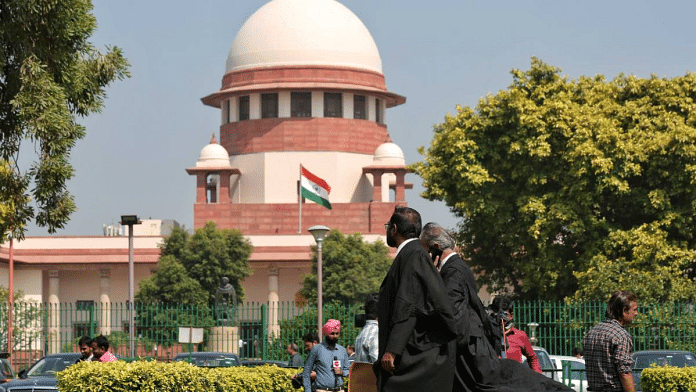New Delhi: In an exceptional move, the Supreme Court last week stayed the operation of Rule 7 of the Surrogacy (Regulation) Act, 2021, to allow a 38-year-old woman suffering from the Mayer-Rokitansky-Küster-Hauser (MRKH) Syndrome —a rare congenital disorder that affects the female reproductive system — to undergo surrogacy using a donor egg.
Notified in March this year, Rule 7 of the Surrogacy Act bans use of donor eggs for the procedure.
On 18 October, a bench led by Justice B.V. Nagarathna, however, kept the rule in abeyance for the woman so that she could continue with the surrogacy procedure. It will, however, continue to operate for others.
The woman is one of the petitioners who has moved the top court challenging the different aspects of the Surrogacy Act and the modified rules made effective in March this year. From Hyderabad, the woman had specifically questioned the retrospective operation of Rule 7.
She made the case that she and her husband had completed the formalities for the procedure much before the Surrogacy Rules were amended to prohibit the use of donor eggs. There was no such bar when the couple had commenced with the procedure, the woman told the court.
During an earlier hearing on 10 October, the bench felt it must obtain a medical opinion before deciding the case and, therefore, directed the District Medical Board in Hyderabad to submit a report on whether the woman suffered from the MRKH syndrome. The board’s report confirmed the woman’s medical condition.
During the hearing on 18 October, the central government counsel, additional solicitor general Aishwarya Bhatti, argued that there is no fundamental right to surrogacy and that the Act aims to regulate it.
“The intention (of rules) is that out of three things, the sperm, egg and the womb, two must be of the intending couple,” Bhatti said. She tried to justify the amendment by arguing that the genetic link with both the parents forming a part of “intending couple” is essential and therefore, the Act prohibits use of donor eggs.
Senior advocate Sanjay Jain, who appeared for the petitioner, said Rule 7 was contrary to Rule 14 (a) of the Surrogacy Act, 2021, which allows the use of donor eggs if the “wife” suffers from any of the medical indications specified in Rule 14. According to Rule 14 (a) a woman may opt for gestational surrogacy if she has no uterus or an abnormal uterus.
Jain also said the amendment to Rule 7 must be read prospectively and not retrospectively. The surrogacy procedure for his client, he informed the bench, commenced in February, before the amendment was introduced. Moreover, his client, he said, also fulfilled the requirement under Rule 14, which spells out that if a woman is disabled to produce a baby on account of an absence of a uterus or repeated failed pregnancies, then she may opt for surrogacy.
A right to ‘parenthood’
The woman’s petition before the top court invokes the latter’s “extraordinary jurisdiction” in which she has asserted her right to “parenthood”, which she is not able to achieve owing to her medical condition.
In her petition, which ThePrint has accessed, the woman said despite her 12 years of married life, she could not conceive naturally. In 2022, after she underwent a thorough medical check-up, the doctors advised her to opt for altruistic surrogacy using donor eggs.
The couple obtained all orders and certificates from relevant authorities before commencing with the procedure. This included receiving an eligibility certificate and essentiality certificate, which are valid till February 2024. Thereafter, the couple got their embryo frozen wherein the donor eggs were used.
While the woman and her husband waited for the “cycles of the surrogate mother” to start the treatment, the new rule stalled the process with the doctors refusing to proceed.
On 17 April, 2023, the couple sent a letter to the director of the National Assisted Reproductive Technology and Surrogacy Board, but got a “vague and negative reply”, the petition claimed.
“Despite having all the certificates, as contemplated under the law and her embryos being frozen, the petitioner is unable to proceed with surrogacy,” senior advocate Jain had told the bench, urging it to consider the case on priority because after February 2024 the certificates granting permission to the petitioner will become stale.
(Edited by Zinnia Ray Chaudhuri)



